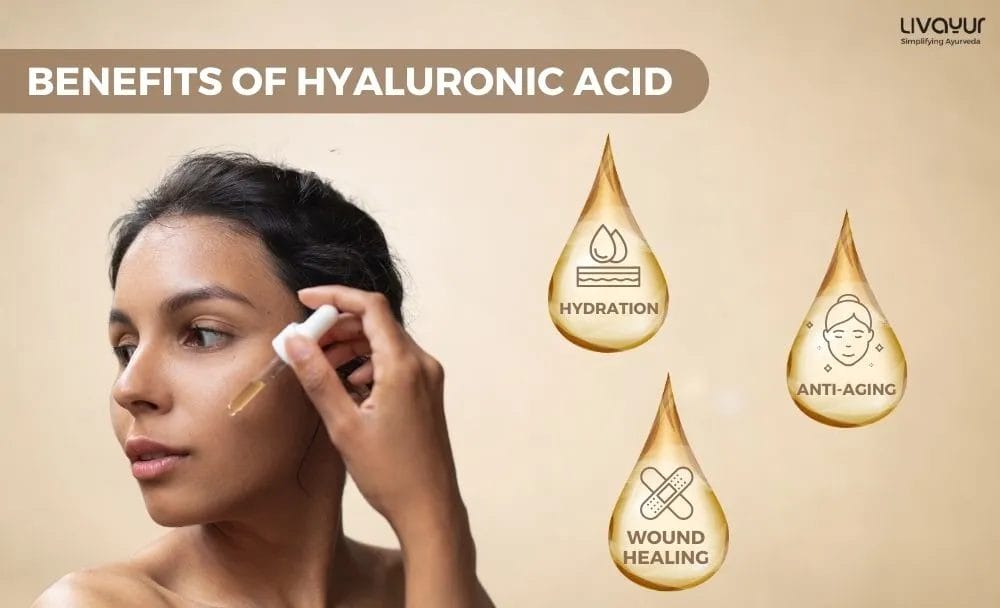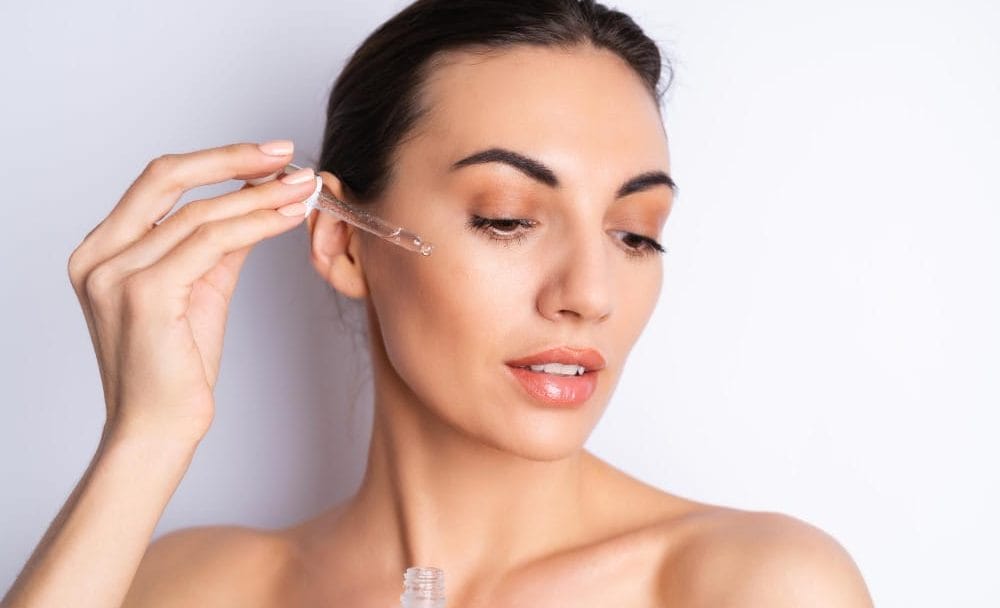
Hyaluronic acid is one ingredient that has risen to the forefront of the beauty world in the quest for radiant skin. It comes with a remarkable ability to hydrate and rejuvenate the skin. This naturally occurring compound has become a go-to favorite for skincare enthusiasts.
This article explores the various benefits of hyaluronic acid for the skin and its versatile applications. We will also look at its potential side effects. So, let’s delve into hyaluronic acid and discover how it can help you achieve your skin’s most luminous potential.
What is hyaluronic acid?
Hyaluronic acid is often referred to as HA. It is found naturally in our bodies. HA plays a crucial role in maintaining skin health and overall tissue hydration. This remarkable molecule is a glycosaminoglycan, a carbohydrate with a unique ability to hold water molecules like a sponge.
Think of it as nature’s hydration superhero. When you apply it to the skin, hyaluronic acid forms a moisture-retaining barrier. It effectively replenishes and locks in essential hydration. Its exceptional water-binding capacity keeps the skin plump and reduces the appearance of fine lines and wrinkles.
As a critical extracellular matrix component, HA contributes to the skin’s elasticity and flexibility. It is an essential ingredient in various skincare products. It has garnered much attention, from serums to moisturizers, for its skin-transforming benefits.
What are the skin benefits of hyaluronic acid?
Here are the impressive skin benefits of hyaluronic acid.
1. Hydrates the skin

It comes with unique water-attracting properties, making it a potent moisturizing agent. It penetrates the skin’s surface and forms a moisture-retaining barrier when applied topically. It helps replenish and lock in much-needed hydration. The intense moisturization imparts a plump appearance to the skin and improves its texture. [1]
2. Contributes to the skin’s antiaging efforts
Our natural hyaluronic acid levels decline as we age. It leads to reduced skin elasticity and increased signs of aging. Incorporating hyaluronic acid into your skincare routine will help you combat these effects. The molecule’s ability to bind with water helps fill out fine lines for a more youthful complexion. [1]
3. Facilitates faster wound healing
It regulates inflammation levels and helps speed up the process of healing wounds. It sends signals to the body to develop more blood vessels in the area that experienced the injury. [2]
What are the uses of hyaluronic acid?
Hyaluronic acid boasts many uses extending beyond skin care. Let’s explore some of the diverse applications:
1. Osteoarthritis surgery
Hyaluronic acid has found significant application in orthopedics, particularly in the treatment of osteoarthritis. The gel-like consistency of hyaluronic acid acts as a lubricant, relieving individuals suffering from joint discomfort. [3]
2. Ocular surgery
Ophthalmologists use hyaluronic acid in eye surgeries. [3]
3. Plastic surgery
Hyaluronic acid is crucial as a dermal filler in plastic and cosmetic surgery. When injected beneath the skin’s surface, it adds volume to areas with lost elasticity or wrinkles, like the lips and cheeks. Using hyaluronic acid in these procedures can result in a rejuvenated appearance. [3]
4. Tissue engineering
Hyaluronic acid’s biocompatibility and ability to retain water make it valuable in tissue engineering applications. It can create scaffolds for cell growth and tissue regeneration, especially in wound healing and tissue repair. [3]
5. Drug delivery
Hyaluronic acid’s unique properties also lend themselves to drug delivery systems. Encapsulating medications within hyaluronic acid-based carriers allows the targeted release of therapeutic agents. The approach allows for improved drug effectiveness and reduced side effects. [3]
How to use hyaluronic acid?
Hyaluronic acid and its derivates are incorporated in a multitude of cosmetic products for eye contour, lips, facial, and neck care, anti-cellulite body care, or cosmetic color conditioning in the following cosmetic categories:
- Creams
- Serums
- Lotions
- Face masks
A significant number of cosmetics based on hyaluronic acid have been launched on the market in the last few years. To incorporate hyaluronic acid in your skincare regimen, you can opt for any serums, masks, creams or lotions with hyaluronic acid content. [4]
What are the hyaluronic acid side effects?
Hyaluronic acid is generally considered safe and well-tolerated. However, like any skincare or medical ingredient, it may have some potential side effects, although they are typically rare and mild. Let’s look at them in detail.
1. Skin irritation
It may manifest as redness or itching at the application site. If you have sensitive skin or a history of allergies, it’s advisable to do a patch test before using a product containing hyaluronic acid to ensure compatibility.
2. A feeling of tightness or dryness
It can occur when the surrounding environment is dry or lacks sufficient humidity. Applying hyaluronic acid products on damp skin and following up with a moisturizer to seal the hydration is essential.
As with any skincare ingredient, following the instructions provided by the manufacturer or your dermatologist to minimize the risk of adverse reactions is crucial. If you experience any side effects from hyaluronic acid products, it’s best to discontinue use and promptly seek advice from a healthcare professional.
Side effects with other drugs
Hyaluronic acid is a polymer that is highly compatible with other polymers. Due to its high compatibility with other polymers and safety, it is used as a prodrug or is used as a carrier for other drugs. In fact, its usage becomes more beneficial that way.
Cross-linked forms of Hyaluronic acid have multiple usages, including in dentistry, child delivery, post-surgery recovery, wound healing, antiseptic, and anti-inflammatory therapies.
No considerable side effects have been recorded on cross-linking hyaluronic acid with other polymers. [4]
Hyaluronic acid and Ayurveda
Ayurveda emphasizes the balance between mind, body, and spirit for optimal health. Hyaluronic acid is a modern skincare ingredient known for its moisturizing properties. Ayurveda has long recognized the importance of maintaining skin hydration and nourishment to promote a healthy and radiant complexion.
Ayurvedic practices often incorporate natural herbs and oils with hydrating qualities, which align with the principles of modern skincare that harness the power of hyaluronic acid. Individuals can achieve a harmonious blend of contemporary science and traditional wisdom when combining these two approaches. It will ensure their skin receives the best of both worlds.
FAQs
1. How good is hyaluronic acid for the skin?
Hyaluronic acid is excellent for the skin. It is a powerful moisturizing agent that can hold water. It helps hydrate and plump the skin, reducing the appearance of wrinkles and promoting a more youthful complexion.
2. What are the benefits of hyaluronic acid for the skin?
The skin benefits of hyaluronic acid include intense hydration and improved skin tone. It also helps diminish fine lines and enhance skin elasticity.
3. What are hyaluronic acid benefits?
Hyaluronic acid benefits include skin hydration and joint health improvement. It also serves as a dermal filler for cosmetic procedures, adding volume to areas like lips.
4. What are hyaluronic acid benefits for the face?
Hyaluronic acid benefits for the face include deep hydration, reduced wrinkles and fine lines, improved skin firmness, and a more radiant complexion.
5. What are hyaluronic acid uses for skin?
Hyaluronic acid finds use in various skincare products like serums, moisturizers, eye creams, and face masks. It provides intense hydration, boosts skin’s moisture retention, and combats signs of aging.
Conclusion
Hyaluronic acid offers plenty of benefits that cater to the skin’s hydration and rejuvenation needs. Its exceptional ability to lock in moisture and promote a radiant complexion has made it a favorite among beauty enthusiasts.
Moreover, the versatility of hyaluronic acid extends beyond skin care. It finds valuable applications in joint health, ophthalmology, and dentistry. Harnessing the power of this naturally occurring molecule can help achieve a harmonious synergy between modern skincare science and ancient holistic practices like Ayurveda. It will ensure your skin receives the best of both worlds.
Disclaimer
The content provided here is for information purposes only. Consult a trained medical practitioner for professional advice or treatment.
References
- Benefit of Hyaluronic Acid to Treat Facial Aging in Completely Edentulous Patients. October 2006
- Hyaluronic Acid in Inflammation and Tissue Regeneration. 28 March 2016
- Chapter Nine – Beneficial Effects of Hyaluronic Acid. 2014
- Advantages of Hyaluronic Acid and Its Combination with Other Bioactive Ingredients in Cosmeceuticals



















